In 1915-1916, the Italian company Gloria Film made a series of nine short silent films based on the stories in the book 'Cuore' (Heart) by Edmondo De Amicis. Earlier we did posts on six of the films: Il piccolo scrivano fiorentino (1915), La piccola vedetta lombarda (1915), Il tamburino sardo (1915), Dagli Appennini alle Ande (1916), Naufragio (1916) and Sangue Romagnolo (1916). In the seventh, Il piccolo patriota padovano/The little patriot from Padua (Leopoldo Carlucci, 1915), child actor Ermanno Roveri plays the lead role once more. Stabilimenti Alterocca in Terni published again a series of postcards to promote the film.
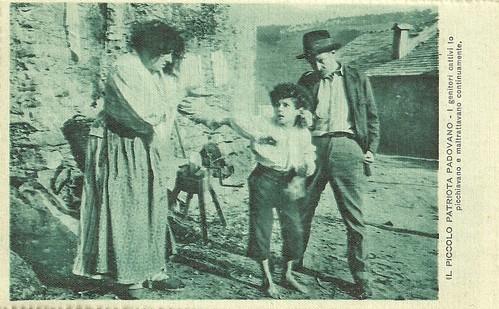
Italian postcard by Stabilimenti Alterocca, Terni, no. 3371. Photo: Film Artistica Gloria, Torino. Publicity still for Il piccolo patriota padovano (Leopoldo Carlucci, 1915). Caption: His bad parents continuously beated and abused him.
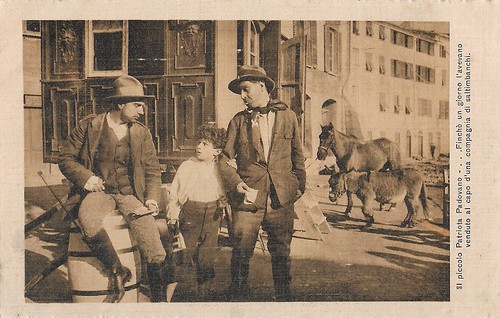
Italian postcard by Stabilimenti Alterocca, Terni, no. 3371. Photo: Film Artistica Gloria, Torino. Publicity still for Il piccolo patriota padovano (Leopoldo Carlucci, 1915). Caption: Until, one day, they sold him to a group of acrobats.
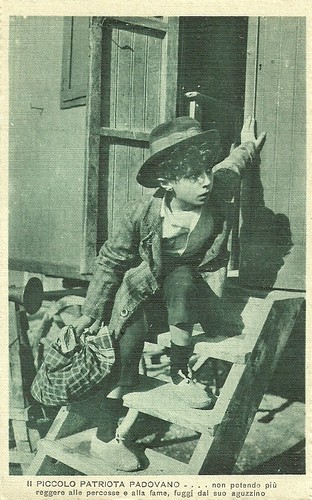
Italian postcard by Stabilimenti Alterocca, Terni, no. 3371. Photo: Film Artistica Gloria, Torino. Ermanno Roveri in Il piccolo patriota padovano (Leopoldo Carlucci, 1915). Caption: No longer able to stand the beatings and the hunger, he escapes his tormentor.
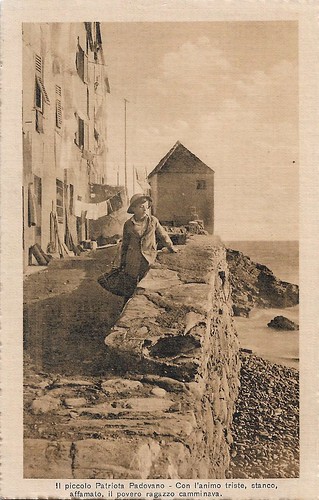
Italian postcard by Stabilimenti Alterocca, Terni, no. 3371. Photo: Film Artistica Gloria, Torino. Ermanno Roveri in Il piccolo patriota padovano (Leopoldo Carlucci, 1915). Caption: Sad, tired, and hungry inside, the poor boy walked on.
In 1886, Edmondo De Amicis' published his popular children's book 'Cuore' (Heart), a volume with nine stories. In Cuore, De Amicis tells about the life of nine boys in a school class in the city of Turin. Cuore is written in a diary form as told by Enrico Bottini, an 11-year-old primary school boy in Turin with an upper class background who is surrounded by working class school mates. The stories are set during the Italian unification, and include several patriotic themes. The other boys are from various parts of Italy, giving a strong hint to the unity between the various regions of the Kingdom, both culturally as well as politically. The book was issued on 18 October 1886, the first day of school in Italy, and rose to an immediate success.
Through the years there were many film adaptations of the book. In 1915-1916, the company Film Artistica Gloria in Turin turned the stories of Cuore into a series of nine short silent films to support the war effort during World War I. In these shorts, the heroes are again nine young Italian boys who sacrifice themselves for their country and fight against the enemies at all time, even in distant wars.
Earlier we did posts on six other films of the series: Il piccolo scrivano fiorentino//The little scribe from Florence (Leopoldo Carlucci, 1915), La piccola vedetta lombarda/The little lookout from Lombardy (Vittorio Rossi-Pianelli, 1915), Il tamburino sardo/The Little Drummer Boy (Vittorio Rossi Pianelli, 1915), Dagli Appennini alle Ande/From the Apennines to the Andes (Umberto Paradisi, 1916), Naufragio/Shipwreck (Umberto Paradisi, 1916) and Sangue Romagnolo/Blood from the Romagna (Leopoldo Carlucci, 1916). Today follows the seventh of the nine films, Il piccolo patriota padovano/The little patriot from Padua (Leopoldo Carlucci, 1915), starring the cute Ermanno Roveri.
Ermanno Roveri (1903-1968) started his career as a child star. In 1913-1914, he had become famous as Frugolino, one of the comic child actors of the Cines company in Rome. In the 1930s and 1940s Ermanno played in a dozen Italian films. He would continue to work in the theatre and incidentally in cinema or on television till his death in 1968. For Gloria Film, he appeared also in the Cuore films Il piccolo scrivano fiorentino//The little scribe from Florence (Leopoldo Carlucci, 1915), Dagli Appennini alle Ande/From the Apennines to the Andes (Umberto Paradisi, 1916), and Naufragio/Shipwreck (Umberto Paradisi, 1916).
In Il piccolo patriota padovano/The little patriot from Padua (Leopoldo Carlucci, 1915), Roveri plays a young boy from Padua, dressed in rags, who is discovered on a boat to Genua. His poor parents have sold him to acrobats, who maltreat him. During a stop in Barcelona, he flees to the Italian consul who helps him return. Aboard the ship to Italy he is nurtured, dressed and foreign visitors give him money, but when he overhears them talking badly about Italy and the Italians, he throws hem back the money, not supporting alimony from those who insult his country.
Posts on the other two films in the Cuore series will follow in the next weeks at EFSP.
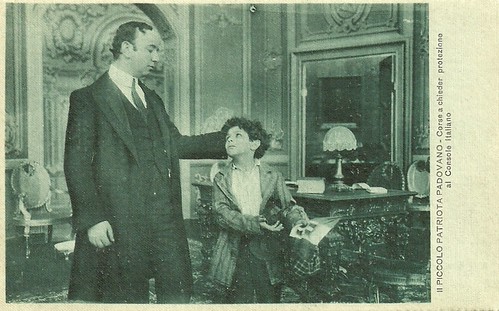
Italian postcard by Stabilimenti Alterocca, Terni, no. 3371. Photo: Film Artistica Gloria, Torino. Publicity still for Il piccolo patriota padovano (Leopoldo Carlucci, 1915). Caption: He ran to ask for protection to the Italian consul.
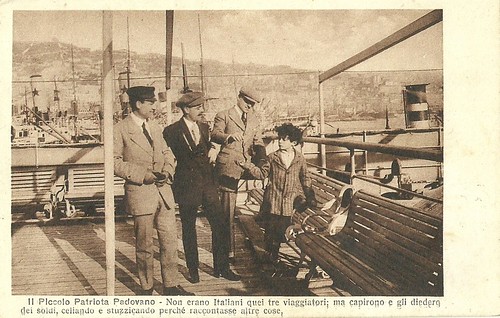
Italian postcard by Stabilimenti Alterocca, Terni, no. 3371. Photo: Film Artistica Gloria, Torino. Publicity still for Il piccolo patriota padovano (Leopoldo Carlucci, 1915). Caption: Those travelers were not Italians, but they understood him and gave him money, jesting with him and urging him on to tell them other things.
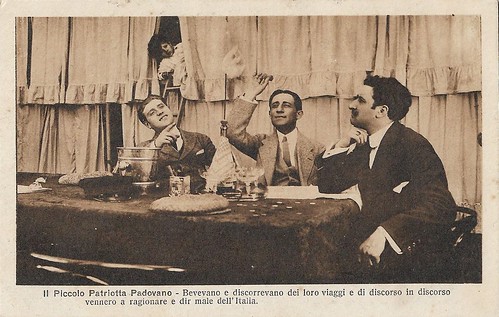
Italian postcard by Stabilimenti Alterocca, Terni, no. 3371. Photo: Film Artistica Gloria, Torino. Publicity still for Il piccolo patriota padovano (Leopoldo Carlucci, 1915). Caption: They drank and discoursed their travels, and from one story to another they started to say evils things about Italy.
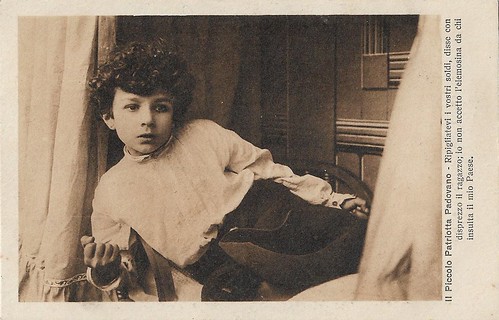
Italian postcard by Stabilimenti Alterocca, Terni, no. 3371. Photo: Film Artistica Gloria, Torino. Ermanno Roveri in Il piccolo patriota padovano (Leopoldo Carlucci, 1915). Caption: Take back your money, the boy disdainfully said, for I won't take any alms from those who insult my Country.
Sources: Wikipedia (Italian and English), IMDb, and the postcards.

Italian postcard by Stabilimenti Alterocca, Terni, no. 3371. Photo: Film Artistica Gloria, Torino. Publicity still for Il piccolo patriota padovano (Leopoldo Carlucci, 1915). Caption: His bad parents continuously beated and abused him.

Italian postcard by Stabilimenti Alterocca, Terni, no. 3371. Photo: Film Artistica Gloria, Torino. Publicity still for Il piccolo patriota padovano (Leopoldo Carlucci, 1915). Caption: Until, one day, they sold him to a group of acrobats.

Italian postcard by Stabilimenti Alterocca, Terni, no. 3371. Photo: Film Artistica Gloria, Torino. Ermanno Roveri in Il piccolo patriota padovano (Leopoldo Carlucci, 1915). Caption: No longer able to stand the beatings and the hunger, he escapes his tormentor.

Italian postcard by Stabilimenti Alterocca, Terni, no. 3371. Photo: Film Artistica Gloria, Torino. Ermanno Roveri in Il piccolo patriota padovano (Leopoldo Carlucci, 1915). Caption: Sad, tired, and hungry inside, the poor boy walked on.
Young Italians sacrificing themselves for their country
In 1886, Edmondo De Amicis' published his popular children's book 'Cuore' (Heart), a volume with nine stories. In Cuore, De Amicis tells about the life of nine boys in a school class in the city of Turin. Cuore is written in a diary form as told by Enrico Bottini, an 11-year-old primary school boy in Turin with an upper class background who is surrounded by working class school mates. The stories are set during the Italian unification, and include several patriotic themes. The other boys are from various parts of Italy, giving a strong hint to the unity between the various regions of the Kingdom, both culturally as well as politically. The book was issued on 18 October 1886, the first day of school in Italy, and rose to an immediate success.
Through the years there were many film adaptations of the book. In 1915-1916, the company Film Artistica Gloria in Turin turned the stories of Cuore into a series of nine short silent films to support the war effort during World War I. In these shorts, the heroes are again nine young Italian boys who sacrifice themselves for their country and fight against the enemies at all time, even in distant wars.
Earlier we did posts on six other films of the series: Il piccolo scrivano fiorentino//The little scribe from Florence (Leopoldo Carlucci, 1915), La piccola vedetta lombarda/The little lookout from Lombardy (Vittorio Rossi-Pianelli, 1915), Il tamburino sardo/The Little Drummer Boy (Vittorio Rossi Pianelli, 1915), Dagli Appennini alle Ande/From the Apennines to the Andes (Umberto Paradisi, 1916), Naufragio/Shipwreck (Umberto Paradisi, 1916) and Sangue Romagnolo/Blood from the Romagna (Leopoldo Carlucci, 1916). Today follows the seventh of the nine films, Il piccolo patriota padovano/The little patriot from Padua (Leopoldo Carlucci, 1915), starring the cute Ermanno Roveri.
Ermanno Roveri (1903-1968) started his career as a child star. In 1913-1914, he had become famous as Frugolino, one of the comic child actors of the Cines company in Rome. In the 1930s and 1940s Ermanno played in a dozen Italian films. He would continue to work in the theatre and incidentally in cinema or on television till his death in 1968. For Gloria Film, he appeared also in the Cuore films Il piccolo scrivano fiorentino//The little scribe from Florence (Leopoldo Carlucci, 1915), Dagli Appennini alle Ande/From the Apennines to the Andes (Umberto Paradisi, 1916), and Naufragio/Shipwreck (Umberto Paradisi, 1916).
In Il piccolo patriota padovano/The little patriot from Padua (Leopoldo Carlucci, 1915), Roveri plays a young boy from Padua, dressed in rags, who is discovered on a boat to Genua. His poor parents have sold him to acrobats, who maltreat him. During a stop in Barcelona, he flees to the Italian consul who helps him return. Aboard the ship to Italy he is nurtured, dressed and foreign visitors give him money, but when he overhears them talking badly about Italy and the Italians, he throws hem back the money, not supporting alimony from those who insult his country.
Posts on the other two films in the Cuore series will follow in the next weeks at EFSP.

Italian postcard by Stabilimenti Alterocca, Terni, no. 3371. Photo: Film Artistica Gloria, Torino. Publicity still for Il piccolo patriota padovano (Leopoldo Carlucci, 1915). Caption: He ran to ask for protection to the Italian consul.

Italian postcard by Stabilimenti Alterocca, Terni, no. 3371. Photo: Film Artistica Gloria, Torino. Publicity still for Il piccolo patriota padovano (Leopoldo Carlucci, 1915). Caption: Those travelers were not Italians, but they understood him and gave him money, jesting with him and urging him on to tell them other things.

Italian postcard by Stabilimenti Alterocca, Terni, no. 3371. Photo: Film Artistica Gloria, Torino. Publicity still for Il piccolo patriota padovano (Leopoldo Carlucci, 1915). Caption: They drank and discoursed their travels, and from one story to another they started to say evils things about Italy.

Italian postcard by Stabilimenti Alterocca, Terni, no. 3371. Photo: Film Artistica Gloria, Torino. Ermanno Roveri in Il piccolo patriota padovano (Leopoldo Carlucci, 1915). Caption: Take back your money, the boy disdainfully said, for I won't take any alms from those who insult my Country.
Sources: Wikipedia (Italian and English), IMDb, and the postcards.
No comments:
Post a Comment